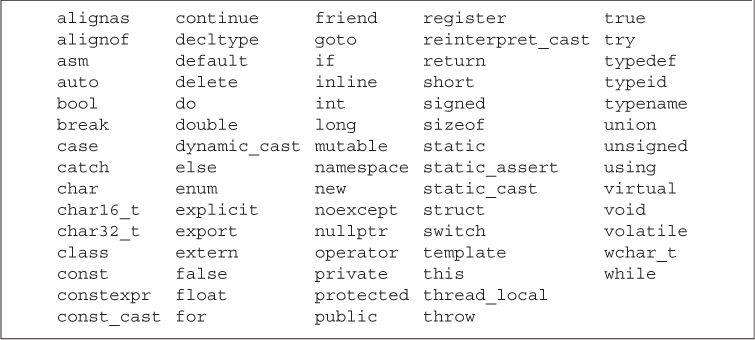- Title Page
- Copyright Page
- Dedication Page
- Contents
- New Features in C++11
- Preface
- Chapter 1. Getting Started
- Part I. The Basics
- Contents
- Chapter 2. Variables and Basic Types
- Chapter 3. Strings, Vectors, and Arrays
- Chapter 4. Expressions
- Contents
- 4.1. Fundamentals
- 4.2. Arithmetic Operators
- 4.3. Logical and Relational Operators
- 4.4. Assignment Operators
- 4.5. Increment and Decrement Operators
- 4.6. The Member Access Operators
- 4.7. The Conditional Operator
- 4.8. The Bitwise Operators
- 4.9. The sizeof Operator
- 4.10. Comma Operator
- 4.11. Type Conversions
- 4.12. Operator Precedence Table
- Chapter Summary
- Defined Terms
- Chapter 5. Statements
- Chapter 6. Functions
- Chapter 7. Classes
- Part II. The C++ Library
- Contents
- Chapter 8. The IO Library
- Chapter 9. Sequential Containers
- Chapter 10. Generic Algorithms
- Chapter 11. Associative Containers
- Chapter 12. Dynamic Memory
- Part III. Tools for Class Authors
- Contents
- Chapter 13. Copy Control
- Chapter 14. Overloaded Operations and Conversions
- Contents
- 14.1. Basic Concepts
- 14.2. Input and Output Operators
- 14.3. Arithmetic and Relational Operators
- 14.4. Assignment Operators
- 14.5. Subscript Operator
- 14.6. Increment and Decrement Operators
- 14.7. Member Access Operators
- 14.8. Function-Call Operator
- 14.9. Overloading, Conversions, and Operators
- Chapter Summary
- Defined Terms
- Chapter 15. Object-Oriented Programming
- Contents
- 15.1. OOP: An Overview
- 15.2. Defining Base and Derived Classes
- 15.3. Virtual Functions
- 15.4. Abstract Base Classes
- 15.5. Access Control and Inheritance
- 15.6. Class Scope under Inheritance
- 15.7. Constructors and Copy Control
- 15.8. Containers and Inheritance
- 15.9. Text Queries Revisited
- Chapter Summary
- Defined Terms
- Chapter 16. Templates and Generic Programming
- Part IV. Advanced Topics
- Contents
- Chapter 17. Specialized Library Facilities
- Chapter 18. Tools for Large Programs
- Chapter 19. Specialized Tools and Techniques
- Appendix A. The Library
- Contents
- A.1. Library Names and Headers
- A.2. A Brief Tour of the Algorithms
- A.2.1. Algorithms to Find an Object
- A.2.2. Other Read-Only Algorithms
- A.2.3. Binary Search Algorithms
- A.2.4. Algorithms That Write Container Elements
- A.2.5. Partitioning and Sorting Algorithms
- A.2.6. General Reordering Operations
- A.2.7. Permutation Algorithms
- A.2.8. Set Algorithms for Sorted Sequences
- A.2.9. Minimum and Maximum Values
- A.2.10. Numeric Algorithms
- A.3. Random Numbers
- Index
- Add Pages
2.2.3. Identifiers
Identifiers in C++ can be composed of letters, digits, and the underscore character. The language imposes no limit on name length. Identifiers must begin with either a letter or an underscore. Identifiers are case-sensitive; upper- and lowercase letters are distinct:
// defines four different int variables
int somename, someName, SomeName, SOMENAME;
The language reserves a set of names, listed in Tables 2.3 and Table 2.4, for its own use. These names may not be used as identifiers.

Table 2.4. C++ Alternative Operator Names

The standard also reserves a set of names for use in the standard library. The identifiers we define in our own programs may not contain two consecutive underscores, nor can an identifier begin with an underscore followed immediately by an uppercase letter. In addition, identifiers defined outside a function may not begin with an underscore.
Conventions for Variable Names
There are a number of generally accepted conventions for naming variables. Following these conventions can improve the readability of a program.
• An identifier should give some indication of its meaning.
• Variable names normally are lowercase—index, not Index or INDEX.
• Like Sales_item, classes we define usually begin with an uppercase letter.
• Identifiers with multiple words should visually distinguish each word, for example, student_loan or studentLoan, not studentloan.
-
No Comment
